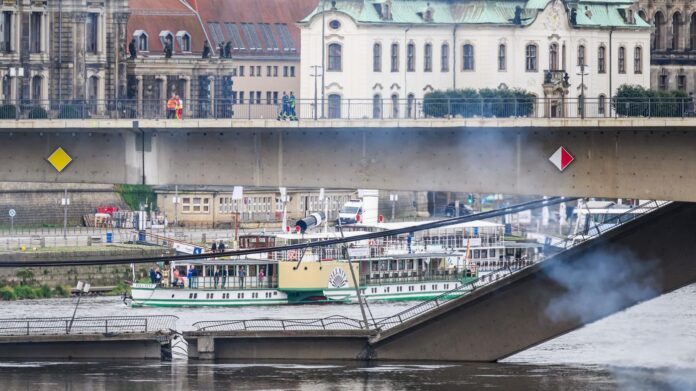
The damaged part of the Carola Bridge in Dresden is to be completely demolished. Preparatory measures for a controlled demolition are currently underway, said fire department spokesman Michael Klahre. However, the fire department believes that approaching storms could make the work more difficult: from Sunday onwards, there is a risk of flooding in the Elbe due to heavy rainfall expected in the Czech Republic. What exactly this means for the operation at the collapse site and the recovery of the debris is still unclear.
The Czech weather service CHMU warned of an extreme risk of heavy rain, high water and flooding in the coming days. Water has already been released from numerous dams in the country to create capacity.
Czech Republic does not want to reduce flow in the Elbe
According to the Saxony State Flood Center, 200 liters of precipitation per square meter within 72 hours are expected in the Czech Republic and southern Poland by Monday. The Czech Republic had already announced that it did not want to reduce the flow in the Elbe. “I am sure that our Saxon colleagues also understand that a bridge that has actually collapsed cannot now have priority over protecting the property and lives of not only Czech but also German citizens,” said Czech Agriculture Minister Marek Vyborny on Wednesday.
There will also be rain in Saxony from Friday to Monday – but the exact amount is still unclear. The German Weather Service’s (DWD) forecasts for Dresden vary between 20 and 70 litres per square metre. However, no storm-like event with enormous amounts of rain is expected in Saxony, it said.
The fire department in Dresden was prepared for a possible flood on the Elbe on Wednesday. “We are sensitized and prepared,” said a spokesman. The further development of the situation is being closely monitored, said the Saxon State Environmental Agency.
Safety work underway after partial collapse
At 2:59 a.m. on Wednesday night, a 100-meter-long section of the Carola Bridge, over which tram tracks and a footpath and cycle path ran, collapsed into the Elbe. No one was injured. According to the Dresden public transport company, the last tram had crossed the bridge just ten minutes earlier, at around 2:50 a.m. The cause of the partial collapse was initially unclear. The police do not currently believe that it was caused by external factors and continue to classify the collapse of the Carola Bridge as an accident. There is no suspicion of a crime so far, said a police spokesman.
An initial assumption is that corrosion played a significant role in the collapse, said Steffen Marx, professor at the Institute of Concrete Structures at the TU Dresden. The bridge – one of the most important traffic arteries in Dresden’s city center – had long been considered in need of renovation. In recent years, parts of the bridge have already been renovated for car traffic, and the renovation of the now collapsed bridge section was planned for next year.
According to the fire department, the partially collapsed Dresden Elbe Bridge is in danger of being completely destroyed. The day after the partial collapse, work was carried out to secure the structure. Last night, a substructure was completed on the Dresden Neustadt side to support the bridge at the crossing to the mainland, said a fire department spokesman.
Demands on politicians are becoming louder
Meanwhile, a debate has erupted about the condition of bridges in Germany. “Basically, you can say that when it comes to large bridges, all bridges built before 1980 are our problem patients,” said bridge expert Martin Mertens, a professor at Bochum University, to the Redaktionsnetzwerk Deutschland (RND). Unfortunately, that is the case for most of them because of the construction boom after the Second World War. Politicians must react. “Dresden shows quite clearly: It’s five past twelve.”
According to a statement, the president of the Central Association of the German Construction Industry, Wolfgang Schubert-Raab, believes that investments are urgently needed. He described the collapse in Dresden as a “sad symbol of German infrastructure” that demonstrates the urgent need for action. The Central Association of the German Construction Industry is also insisting that the renovation of bridges in Germany should be given top priority following the partial collapse.
Federal Transport Minister Volker Wissing (FDP) pointed out in the budget debate in the Bundestag that more than nine billion euros would be available for investments in federal highways and bridges next year. With regard to the collapse of the Carola Bridge in Dresden, he explained that it was a municipal responsibility and therefore had nothing to do with the federal budget. “But you can see from this bridge how dangerous it is if you don’t invest carefully in infrastructure.”
© dpa-infocom, dpa:240912-930-230689/1
This is a message directly from the dpa news channel.
